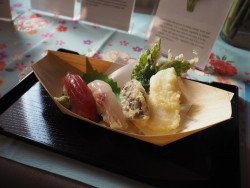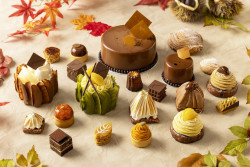
June 4, 2009
Band of Sisters
After finding fame as otaku idols, the Nakano Fujoshi Sisters are striking gold as a boy group
By Metropolis
Originally published on metropolis.co.jp on June 2009

Fudanjuku boys (and NFS girls), from left: Renji Ruhara (Mariru Harada), Kojiro Akazono (Yuka Konan), Kyohei Midorikawa (Yuka Kyomoto), Yosuke Shijuin (Yoko Inui), Momotaro Bukiya (Chiaki Kyan), Kanbei Saiki (Hirono Arai), Uramasa Seimyoji (Erika Ura) Courtesy of Teichiku Entertainment
Mariru Harada was named Race Queen of the Year in 2006, but in her room you won’t find fashion makeup and designer shoes. In their place are 13,000 manga (enough to earn her the title “manga sommelier”), 1,000 limited edition anime DVDs, and 7,000 videogames, including dating simulator games of the sort popular among lonely men.
“I have given up on the three-dimensional world,” says the model, singer and tarento. “I try to look normal when I go outside, but that’s the extent of it.”
Harada is a new breed of pin-up girl and pop queen—the otadol (otaku idol). And she has six sisters. Meet the Nakano Fujoshi Sisters (NFS, pronounced Nakano Fujosisters), an idol unit comprised of Harada, Yoko Inui, Chiaki Kyan, Yuka Kyomoto, Erika Ura, Yuka Konan and Hirono Arai. As evidenced by their dance cover of “Pre-Parade” from the late-night anime Toradora!, NFS and their fans are profoundly otaku. But the Sisters have also found mainstream success disguised as Fudanjuku, a beautiful “boy” group who sang the end theme for the Yatterman anime (released as a single this week), and will sing the opening theme in Korean for international broadcast. Though the NFS and Fudanjuku are technically separate bands, they are inextricably linked by the same well of otakudom.
 |
| Fudanjuku’s new CD single, “Katsunda!” from Yatterman, is available from Teichiku for ¥1,200 (¥1,500 with DVD).
“Pre-Parade” is available on the compilation Anisong Plus x Anime Dance, on sale July 1. The Nakano Fujoshi Sisters and Fudanjuku perform live at Shibuya O-East on June 14. See concert listings (popular) for details. The Net Star airs the first Friday of the month at midnight on NHK BS2. |
Formed in 2006, the NFS gained renown after appearing on the internet TV show ShowTime & GyaO and in live houses around Nakano.
“We used to perform for 30 people, but a live performance in Nakano Broadway last year drew 1,000 people,” says Kyan. “Our activity is still based around Nakano, but for live performances there aren’t any places large enough to fit the audience.”
NFS concerts now tend to be in trendier neighborhoods like Shibuya, but Nakano remains close to their hearts.
“Akihabara is a really famous otaku holy land in Japan, and Ikebukuro is well know for female fans, fujoshi,” says Inui, the group leader. “But Nakano has a very developed subculture. It has the good parts of both Akihabara and Ikebukuro. There are so many stores there to get immersed in. One visit to the shopping arcade reveals so many great things all at once. We wanted to work to be part of that and promote it.”
That explains the “Nakano” in their name, but in fact not all the members are fujoshi (腐女子), or “rotten girls” who read the yaoi genre of homosexual male romance manga.
“We take ‘fujoshi’ to mean someone who carries things to extremes,” explains Ura. “What connects us is being rotten because of our passions.”
Each member of NFS has an “otaku profile” (or wotazokusei—basically, their hobbies), which include manga, games, cosplay, anime, faeries, reptiles, professional wrestling, fashion and cooking. They use the word wotaku to indicate that they are neither old-school ’80s otaku (typically written おたく) nor “international and cool” otaku (オタク).
Intentionally cool or not, the NFS have been earning some serious mainstream media attention. The famous TV tarento Suzanne is a former member, and anime aficionado Kyan (or “Kyanchi” to her legions of rabid otaku fans) is the host of NHK’s Net Star, a program that introduces hit contents and famous people from the online world, most especially otaku video-sharing site Nico Nico Douga (a.k.a. Smile TV).







